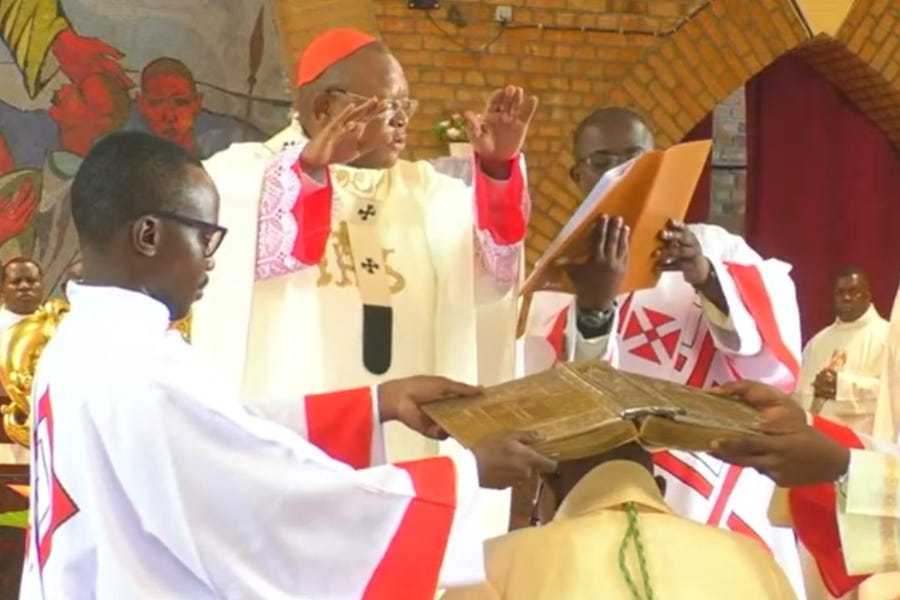Congolese cardinal seeks ‘solution’ as diocese rejects bishop
Description
A cardinal has urged priests in a troubled Congolese diocese to “find a positive solution” to a crisis caused by local Catholics’ rejection of their new bishop.

In an Oct. 17 homily at St. Joseph Cathedral in Wamba, northeastern Democratic Republic of the Congo, Cardinal Fridolin Ambongo appealed to clergy to allow Bishop Emmanuel Ngona Ngotsi to formally take possession of the diocese.
“We cannot manage the affairs of the Church like those of the city,” he said.
Pope Francis named Ngona Ngotsi, a priest of the Missionaries of Africa (White Fathers), as the Bishop of Wamba on Jan. 17, 2024. Cardinal Ambongo consecrated him as a bishop on Sept. 15, 2024 in the Congolese capital, Kinshasa.
Ngona Ngotsi has been unable to take canonical possession of the remote diocese due to opposition from local priests and laity, who are said to insist that a new bishop should be from the Wamba diocese. His appointment followed the 30-year tenure of Bishop Janvier Kataka Luvete, who was born in Zambia.
Local Catholics held a protest against the appointment in February 2024, during which they reportedly demanded a bishop who was indigenous to Wamba.
Ngona Ngotsi was born in the town of Bambu-Mines in the Diocese of Bunia, which neighbors the Wamba diocese. He served in Niger and Burkina Faso before returning to the Democratic Republic of the Congo.
The Wamba dispute recalls a controversy in Nigeria’s Ahiara diocese, where local Catholics rejected Pope Benedict XVI’s 2012 appointment of Fr. Peter Ebere Okpaleke as their bishop because he was not a priest of the diocese or a member of the Mbaise ethnic group.
Pope Francis accepted Okpaleke’s resignation as Bishop of Ahiara in 2018, after he was unable to take possession of the diocese, appointing him bishop of another Nigerian diocese in 2020 and elevating him to the rank of cardinal in 2022.
The apostolic nunciature in Kinshasa announced in a Sept. 22 letter to Congolese bishops that the Vatican Dicastery for Evangelization, which oversees the Diocese of Wamba, had decided to suspend the formation of seminarians.
The dicastery took the rare step because it deemed that priestly formation “in such a difficult ecclesial atmosphere” was inappropriate. It advised Wamba’s seminarians to seek assistance in continuing their studies from other Congolese bishops.
Ambongo traveled to Wamba Oct. 15 as an envoy of Pope Leo XIV, with the task of easing tensions around Ngona Ngotsi’s appointment. Speaking during a brief stop in Isiro, the capital of the Haut-Uele Province, on the way to Wamba, the cardinal asked for prayers.
“The Holy Father is sending me to the people of God who are in Wamba,” he said. “I ask you to pray that this mission, which is so dear to his heart, will bear good fruit.”
Ambongo added that Leo XIV hoped “the situation in Wamba will return to normal and the diocese will be able to function fully.”
In a sign of the wider significance of the dispute over the episcopal succession in the Wamba diocese, the provincial government of Haut-Uele sent three officials to attend Ambongo’s Oct. 17 Mass at St. Joseph Cathedral.
Speaking on behalf of the provincial governor, finance minister Jacques Anzatepedanga said the civil authorities were deeply concerned by the crisis and urged all parties to engage in dialogue and find a lasting solution enabling the diocese to resume normal functioning.
The Wamba diocese, erected in 1949, covers an area of 26,265 square miles and serves almost 365,000 Catholics. In 2023, it had 25 parishes and 58 priests. It is located in the northeastern part of the country near South Sudan and Uganda. Unlike other provinces in the east of the country, it has not been engulfed by war, but its security situation is unstable due to porous borders and disputes over mineral extraction rights.
Before Ngona Ngotsi’s appointment, the Wamba diocese was led for almost 30 years by Zambia-born Bishop Janvier Kataka Luvete, who retired in 2024 at the age of 76.





